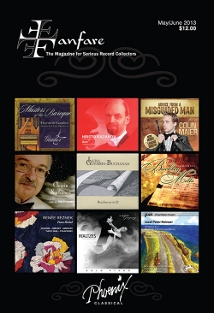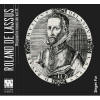Texte paru dans: / Appeared in:

Fanfare Magazine: 36:5 (05-06/2013)
Pour
s'abonner / Subscription information
Les abonnés à Fanfare Magazine ont accès aux archives du
magazine sur internet.
Subscribers to Fanfare Magazine have access to the archives of the magazine
on the net.
MEW1268

Code-barres / Barcode : 5425008312682
Consultez toutes les évaluations recensées pour ce cd
~~~~ Reach all the evaluations located for this CD
The first album in this series was reviewed by J. F. Weber just this past year (MEW 1158; Fanfare 35:6). Unusually, it focused on Lassus’s age at time of composition—all published by the time he had turned 25—rather than theme, or genre. This disc takes up where the other left off, around the composer’s 25th year, and continues forward for another 12. During this time he was hired in the unspectacular role of tenor secundus for Duke Albrecht V’s Bavarian court chapel. His ascendency was quick by any standards, becoming maestro di cappella a scant seven years later.
The collection is broad, and as Weber noted, less a musical biography as the liner notes state than a sampling of Lassus’s huge, varied, and excellent oeuvre. Thus we get the Gloria from the early Missa on me l’a dict, a charmingly bright piece based on a Certon chanson published in 1539, and a risible yet winsome chanson, Vous qui aimez les dames, that alternates French and Latin lines. Several other French chansons and Italian madrigals and motets follow, published by firms in Antwerp, Munich, Nuremberg, and Paris. The liner notes suggest that the parody of the beautiful Marian hymn Verbum bonum, Ave color vini clari, must have been intended for one of Albrecht’s celebrated, over-the-top banquets; whether true or not, it is both fun, and well constructed. We get a six-voice Magnificat and the soufflé-light four-voice chanson it’s based on, and a series of sacred and secular Lied published in 1567. Of three secular motets published in his 1569 collection, Cantiones aliquot quinque vocum, Res neque ab infernis is an affecting work in the Phrygian mode, based on a neo-Platonist text that describes love as created by the will of the gods. Sidus ex claro veniens Olympo celebrates Christ’s birth in moving terms, and Edite Cæsareo Boiorum praises Albrecht, while weaving imitative points and worshipful homophonic textures.
The performing
group of that first release in the series was Bruno Boterf’s Ludus Modalis,
and Weber was strongly impressed. This release features Singer Pur, instead.
The core of six singers—soprano, baritone, bass, and three tenors—is
augmented by one soprano and bass, and by guitar in one selection: an
Italian villotta by Filippo Azzaiolo. They are deft in handling the range of
styles, genres, and languages reflected in these selections. Imitative and
canonic textures are always clear, all voices balanced to bring out salient
lines without drowning subsidiary ones. Chordal blends are refined, and
sleek. Fair warning: They are inexpressive in all this music, so don’t hope
for something along the lines of Le Poème Harmonique or Les Voix Baroques,
emoting when appropriate. That said, there is much pleasure to be had in
these performances. Recommended.
Fermer la fenêtre/Close window
Cliquez l'un ou l'autre
bouton pour découvrir bien d'autres critiques de CD
Click either button for many other reviews


